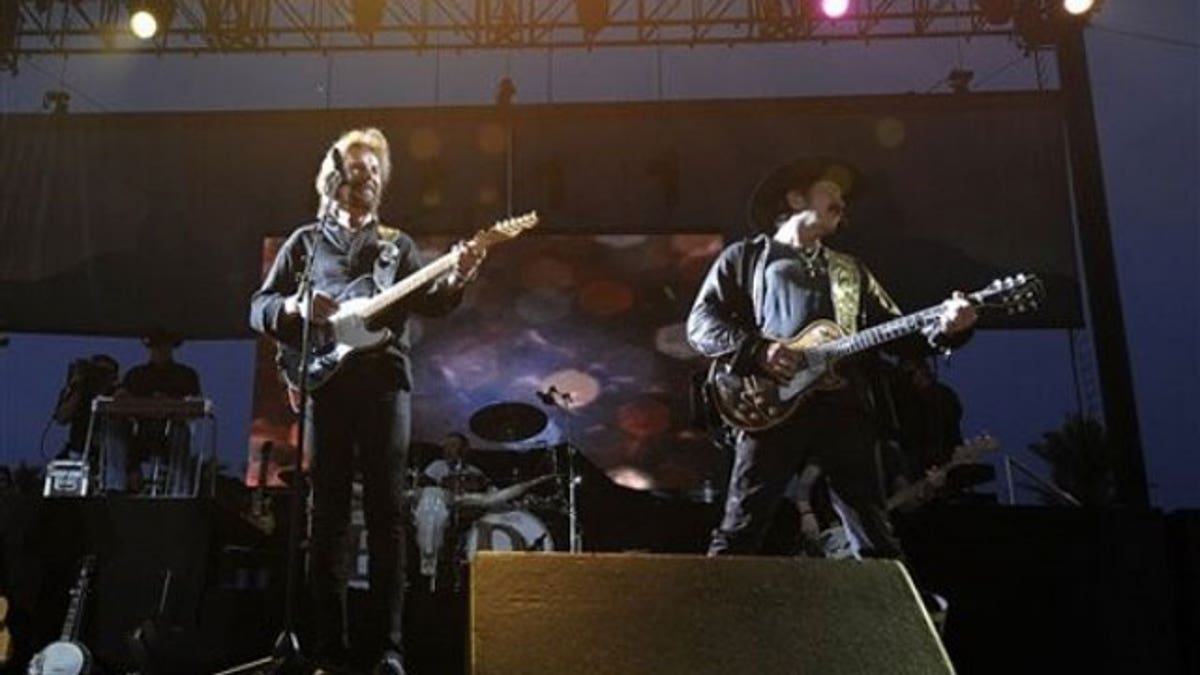
Brooks and Dunn. (Reuters)
Calls to boycott Arizona in the wake of the passage of Senate Bill 1070, otherwise known as The Support Our Law Enforcement and Safe Neighborhoods Act, are going unheeded by most big-name musical acts.
Soon after Governor Jan Brewer signed the controversial bill into law, Canadian indie pop band Stars called for a boycott of the state. While a full-scale boycott has not unfolded, this month the first major show cancellation hit Arizona’s second largest city, Tucson. But so far the impact on the summer concert season appears to be minimal.
Cities like Phoenix and Tucson, despite their oppressive summertime heat, attract hundreds of musical acts, from mega-stars like Brooks & Dunn and their farewell tour to package concert events such as the Sarah McLachlan-fronted Lilith Fair and the punk-heavy Vans Warped Tour.
This spring Tucson's Rialto Theatre had rolled out the red carpet for multi-platinum rap group Cypress Hill. The nonprofit venue had the promotional machine in full effect ahead of the planned May 21 show, including a giant mural painted on the outside wall of the venue facing the entrance to downtown Tucson. However, on May 10, the band posted an announcement on their website that they would be canceling their Tucson date in "a show of resistance to the criminalization of immigrant communities and in opposition to SB1070."
Cypress Hill and their management went silent after the cancellation, but Rialto general manager Curtis McCrary shared his letter to the band, which urged them to perform as an act of social protest and to entertain fans who had nothing to do with the bill itself, while emphasizing that the venue would be "in league with you on this matter, regardless of what you ultimately decide."
Other venues braced for a wave of cancellations by acts with Latin heritage after Miami-based rapper Pitbull canceled his May 31 show in Phoenix and Los Lobos publicly considered a boycott of the state. Some music fans, especially those planning to see Cypress Hill or Pitbull perform, were probably upset by the cancellations. But with well over 60 percent of Arizonans supporting SB1070, just as many or more residents of the state were either indifferent to or contemptuous about the political protests by the artists. Comment sections in articles written about the issue were quickly filled with pro-SB1070 voices.
The reaction within the music industry itself, however, was not resounding, with no other artists making widely publicized announcements about cancellations — or willing to go on the record opposing the bill.
Singer Belinda Carlisle had expressed on Facebook that she wanted the Lilith Fair date that her band was scheduled to play to be canceled, but within hours, the complaining post was removed. One band's publicist (who wanted to remain anonymous) might have summed up the general industry perspective in saying that his acts were willing to sell tickets to anyone willing to pay, regardless of their political perspective.
For now, at least, it seems that the Cypress Hill and Pitbull cancellations are an aberration. According to David Slutes, entertainment director for the acclaimed Tucson venue Club Congress, Los Lobos are now convinced that a boycott would be less productive than playing shows in Arizona and rallying a base likely to oppose the bill. Slutes is in the midst of planning a large Latin music-themed show for the venue’s anniversary and said that the acts he's contacted are more interested in performing for their fans and possibly speaking from the stage and setting up voter-registration tables than choosing to avoid the state entirely.
However, among those with an eye on the state's music trends, there's still concern about the economic fallout from the legislation. Slutes mentioned that a band faced with similar paydays for shows in either Phoenix or Albuquerque might choose the less controversial option.
Martin Cizmar, music editor of the Phoenix New Times and blog PHXMusic.com, put it this way: "Even if these bands did want to play here, some of them are going to be worried about offending politically conscious fans. The cancellations and public boycotts will get all the ink, but the really big losses are going to be silent, people just avoiding the potential hassle and skipping us without saying anything."





















